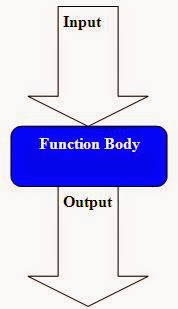Functions are a block of statements which can be reused.
As shown in below image, each function takes input, does the
processing on that input and then produces the output.
Uses of C functions
- C functions are used to avoid rewriting same logic/code again and again in a program.
- There is no limit in calling C functions to make use of same functionality wherever required.
- We can call functions any number of times in a program and from any place in a program.
- A large C program can easily be tracked when it is divided into functions.
- The core concept of C functions is re-usability and dividing a big task into small pieces.
Built in VS user defined
There are 2 types of functions.
- Built-in functions.
- User Defined functions.
Built-in functions are defined in the standard c library
while user defined functions are created by user.
For example –
printf is a built-in function that can be used to print the
data to standard output console.
We will see how to define the user defined functions in next
2 sections.
Function Declaration
Each function takes input and produces output.
Input can be of any data type.
Example –
int sum (int a, int b)
In above statement, we have declared function with name sum
which takes input in the form of 2 arguments a and b of type int and returns
the output in the form of integer type.
Function definition:
Sample example on
function is given below. We have defined one function with name add
Add function takes 2 inputs p1 and p2 and returns one variable with int data
type.
#include<stdio.h>
int add( int p1,int p2 );
void main()
{
int a=10;
int b=20, c;
//we are calling
add function here
//a and b
are actual arguments
c = add( a, b );
printf("sum of a and
b is %d \n", c);
}
int add( int p1,int p2 )
{
int t;
t=p1+p2;
return t;
}






No comments:
Post a Comment
Leave your valuable feedback. Your thoughts do matter to us.